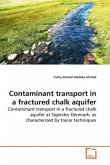Chalk is a soft, white, porous sedimentary rock, a form of limestone composed of the mineral calcite. It forms under relatively deep marine conditions from the gradual accumulation of minute calcite plates (coccoliths) shed from micro-organisms called coccolithophores. It is common to find flint and chert nodules embedded in chalk. Chalk can also refer to other compounds including magnesium silicate and calcium sulfate. Chalk is resistant to erosion and slumping compared to the clays with which it is usually associated, thus forming tall steep cliffs where chalk ridges meet the sea. Chalk hills, known as chalk downland, usually form where bands of chalk reach the surface at an angle, so forming a scarp slope. Because chalk is porous it can hold a large volume of ground water, providing a natural reservoir that releases water slowly through dry seasons. Chalk has long been quarried in England, providing building material and marl for fields. In southeast England, Deneholes are a notable example of ancient chalk pits. The Chalk Group is a European stratigraphic unit deposited during the late Cretaceous Period. It forms the famous White Cliffs of Dover in Kent, England.
Bitte wählen Sie Ihr Anliegen aus.
Rechnungen
Retourenschein anfordern
Bestellstatus
Storno








